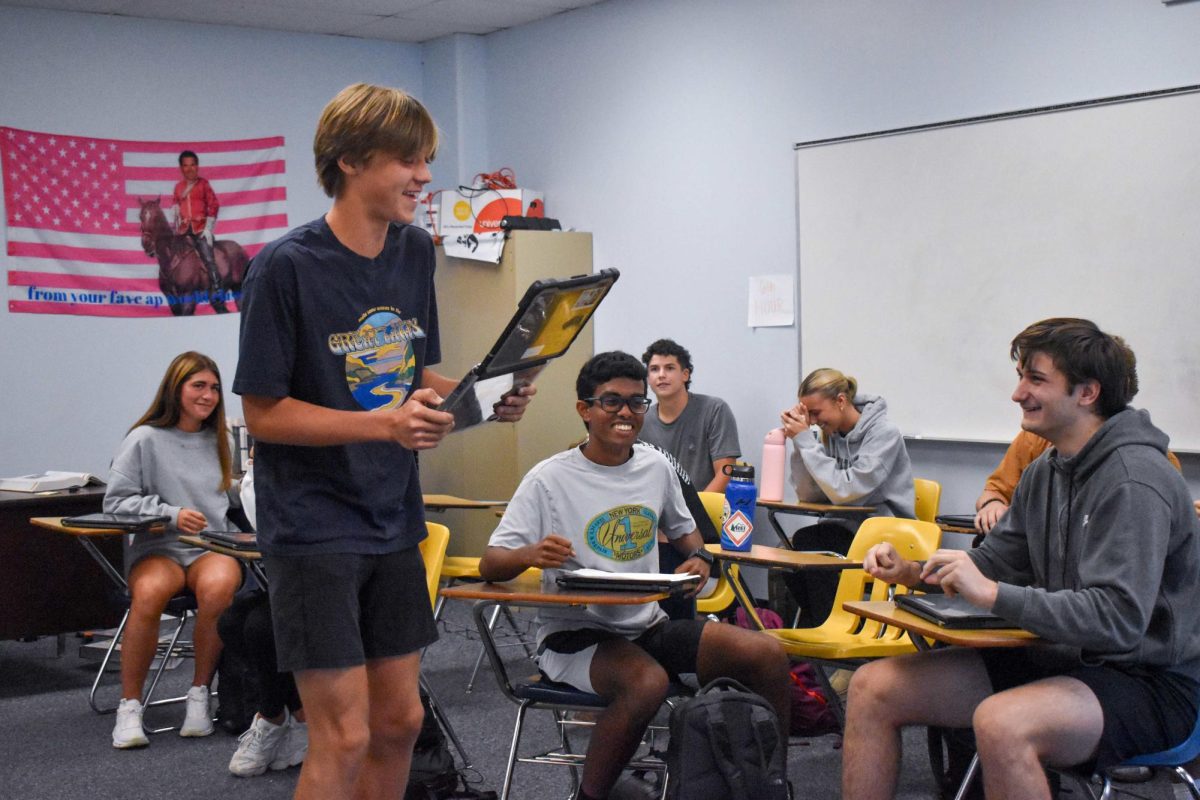Following a rise in the unhealthy consumption of unleaded gas, inefficient automobiles and air pollution, activist Rachel Carson authored ŌĆ£Silent SpringŌĆØ in 1962. This book inspired environmental change, including the work of Sen. Gaylord Nelson and activist Denis Hayes to officially create Earth Day, a yearly protest taking place on April 22. These protests not only fought against oil spills and clean air, but also brought forth a movement toward sustainable agriculture and farming. Today, senior Adam Zerega carries on the green movement by implementing practices at his own farm.
Since his birth, Zerega has spent almost every weekend at his familyŌĆÖs farm, located 10 miles North of Rolla, Mo. ZeregaŌĆÖs key roles on the farm include maintaining the wildlife and habitats.┬Ā
When Zerega is not working on his own, he works with his father, grandfather, friends and neighbors. Neighboring farmers come together in ZeregaŌĆÖs farming community, often helping each other out to complete tasks as quickly as possible.┬Ā
ŌĆ£IŌĆÖm [at the farm] all the time. It has always been a place where me and my family go to spend time with each other. ItŌĆÖs always been important to me,ŌĆØ Zerega said. ŌĆ£[As for] the community, I’ve made a lot of friends, even though they’re older. You make connections with people that have the same mindset, people that enjoy the [outdoors].ŌĆØ
To make sure that ZeregaŌĆÖs farm is sustainable, his family practices no-till drilling, which uses specialized equipment to minimize soil erosion and disturbance. Like Zerega, farmers who used no-till drilling saved over 763 million gallons of fuel per year from 2013 to 2016. Zerega also completes prescribed burns and prioritizes timber and water management on his property.┬Ā
ŌĆ£No-till drilling allows us to not have to disturb the soil, which helps keep erosion down, and helps reduce the amount of chemicals that we need to use. It reduces fuel because we only have to drive the tractor over the field once or twice, rather than four or five times,ŌĆØ Zerega said.┬Ā
At school, Zerega takes AP Environmental Science, a course that has concentrations in sustainable farming and agriculture. Contributing with his experiences, Zerega has been an active participant of environmental conversations led by science teacher Paul Hage.┬Ā
ŌĆ£We don’t often have a lot of people who grow up on farms in class, so [Zerega has] a unique perspective,ŌĆØ Hage said. ŌĆ£What’s amazing about environmental science is that so much of it relates to normal life.ŌĆØ
In the future, Zerega hopes to use his past experiences on the farm, as well as what he has been learning at school, to continue to connect within his farming community and expand his farm.┬Ā
ŌĆ£The farming community is a great way to connect with the outdoors; that’s what I like doing the most,ŌĆØ Zerega said.

![Senior Adam Zerega stands with senior Dexter Brooks by farm equipment. Zerega often worked with friends and family on his farm. ŌĆ£I've been able to go to my family's farm since I was born. I [spend] at least three weekends a month [on the farm], so I'm there all the time,ŌĆØ Zerega said.](https://pwestpathfinder.com/wp-content/uploads/2025/04/IMG_4872-1200x900.jpg)


![Freshman Daphne Stokes looks at a table with Veterans Day flyers and information on Nov. 11. Stokes, along with other West High students, like senior Alexander Lewinski, passed by the table in the cafeteria with army recruitment information and giveaways for students to observe during lunch. ŌĆ£Talking with [the recruiters] has definitely helped me [find] where I wanted to go, more than anything else,ŌĆØ Lewinski said.](https://pwestpathfinder.com/wp-content/uploads/2025/11/DSC_1227-2-1200x800.jpg)
![Helping a customer, print room assistant Gretchen Williams operates her booth at the West High Craft Fair from Oct. 25-26. This was WilliamsŌĆÖ first time participating in the Craft Fair with her new craft shop, Gs Beaded Boutique. ŌĆ£People have always said, over the years, ŌĆśyou should open something.ŌĆÖ [I replied that] I would rather just make [my crafts as] gifts for people. I just started [the online store] up, and it's been okay. I'm always surprised [by] how many views I get and [the] people from different states buying things; somebody from Alaska bought something the other day.ŌĆØ](https://pwestpathfinder.com/wp-content/uploads/2025/11/DSC0451-2-1200x799.jpg)
![Gesturing toward the clubŌĆÖs name on the board, Global Youth Aid co-president year Daniah Alsagheer discusses upcoming service projects with members during a meeting on Oct. 30. ŌĆ£We might be one club at one school, but together, weŌĆÖre [part of] something much bigger,ŌĆØ Alsagheer said.](https://pwestpathfinder.com/wp-content/uploads/2025/11/DSC00949-1200x800.jpg)
![Focused on providing exceptional service, sophomore Darsh Mahapatra carefully cleans the door of a customerŌĆÖs car. Mahapatra has always believed his customers deserve nothing less than the best. ŌĆ£[If] theyŌĆÖre trusting us with their car and our service, then I am convinced that they deserve our 100 percent effort and beyond,ŌĆØ Mahapatra said.](https://pwestpathfinder.com/wp-content/uploads/2025/10/DSC_0018-1200x800.jpg)
![Sophomore Aleix Pi de Cabanyes Navarro (left) finishes up a soccer game while junior Ava Muench (right) warms up for cross country practice. The two came to Parkway West High School as exchange students for the 2025-2026 school year. ŌĆ£The goal for the [exchange] program is to provide opportunities for both Parkway students and our international exchange students to learn about other cultures, build connections and become confident, capable, curious and caring ŌĆö ParkwayŌĆÖs Four CŌĆÖs ŌĆö in the process,ŌĆØ Exchange Program Lead Lauren Farrelly said.](https://pwestpathfinder.com/wp-content/uploads/2025/10/Feature-Photo-1200x800.png)

![Gazing across the stage, sophomore Alexis Monteleone performs in the school theater. The Monteleone familyŌĆÖs band ŌĆ£Monte and the MachineŌĆØ has been releasing music since 2012, but Alexis started her own solo career in 2024 with the release of her first single, Crying Skies. ŌĆ£My whole family is very musical, [and I especially] love writing [songs with them],ŌĆØ Monteleone said.](https://pwestpathfinder.com/wp-content/uploads/2025/09/DSC7463-1200x798.jpg)
![Amid teaching a lesson to her AP Calculus BC class, Kristin Judd jokes alongside her students in their funny remarks. Judd has always enjoyed keeping the mood light in her classroom, along with on the volleyball court. ŌĆ£[I enjoy] that side talk where you see [or] overhear a conversation and chime in, or somebody says something funny,ŌĆØ Judd said.](https://pwestpathfinder.com/wp-content/uploads/2025/09/image-1200x730.jpg)
![Eyeing the ball, junior Ella McNeal poses for her commitment pictures at Clemson University. McNealŌĆÖs commitment comes after months of contact with top Division 1 soccer programs. ŌĆ£ It has taken a lot to get to where I am, but I know that [what] I've already been through is just the beginning, and I can't wait for what is to come,ŌĆØ McNeal said.](https://pwestpathfinder.com/wp-content/uploads/2025/09/IMG_4926-1200x900.jpeg)
